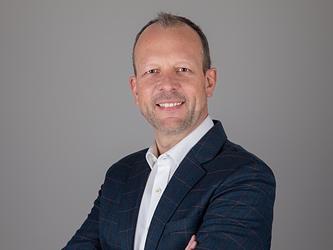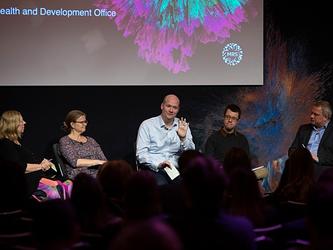‘Broader than just market research': Insight is central to Haleon’s growth plans
Last year, pharmaceutical company GlaxoSmithKline (GSK) spun off its consumer healthcare business – the maker of brands including Sensodyne and Panadol – to form standalone company Haleon. The new name is an amalgamation of ‘hale’ – an Old English word meaning ‘in good health’ and the name ‘Leon’ – associated with ‘strength’.
James Sallows, global head of transformation and capability, consumer and business insights and analytics, joined the business when it was still part of GSK in early 2019, after numerous agency-side insight leadership roles at agencies including Lightspeed, Ipsos and Schlesinger. When we speak over video call in the summer, Haleon has just celebrated its first anniversary. “I’ve seen a real evolution between where GSK was and where Haleon is and is planning to go,” he says.
Essentially, his role is looking after the transformation of the insights function and ensuring the wider business has the right capabilities to support that. “That’s people, platforms and programmes – because there’s no point having an ambition if we’re not bringing the people and don’t have the business along with us,” explains Sallows.
When Haleon launched in July 2022 following the demerger, the company announced that its competitive advantage lay in its ability to combine ‘deep human understanding’ with science.
“That deep human understanding is insights, but it’s in a much broader sense than just market research,” says Sallows. “So that also allows us to broaden the field and the perception of the function, which I think is really important.”
One of the first things his team did was to define what an insight is – the reason being to “get away from numbers and dashboards”. Internally, he says they paraphrase “deep human understanding” as “from the ‘what’ to the ‘why’”.
“That very simple phrase allows us to bring in much broader sources of insights, but also to look across the business as to where insights can come from, and what insight is,” says Sallows. “For Haleon, it is a significant priority, and publicly stated to investors, and internally, that’s a culture change in terms of not just getting insights and data from consumers, but actually just inviting voices into the business, whoever they may be.”
How has that changed the way in which the insights function works with other teams? For one thing, there is a ‘broader understanding’ of what insight does, according to Sallows. He cites the example of an all-company broadcast he and his team ran on how to upskill colleagues in human understanding that he says had the highest spontaneous uptake of any global comms broadcast. “That was people coming on to understand how, in [their role] they should they be leveraging insights or working more closely with insights.”
The team also experiences more incoming requests to partner, and works ‘with better interconnectivity’ across the business, according to Sallows – that might be, for example, working with the customer relations teams to bring in more insights from incoming queries.
There are also more subtle signs of how things have changed. The company’s latest financial results, published in August and reporting organic growth of 10.4% for the first six months of the year, include several mentions of ‘deep human understanding’.
Sallows feels that the shift really started after the function set out its aims a few years ago, before the spin-off. “We were kind of already on this path. So, when the business opened the doors and said, ‘OK, deep human understanding. What is it?’ we were ready to seize that and say, ‘We can help. And we can help define that from within our function outwards’.”
Working with teams across the business such as procurement, finance, quality and supply chain and human resources, Sallows has been trying to understand how insight techniques can be used internally to impact business performance – a shift from focusing insights squarely externally on consumers and market opportunities.
Perhaps the clearest example of this approach to insight is the mini MBA (Master of Business Administration) in deep human understanding, launched at the start of 2023, which is available to all employees globally. Sallows’ team started working with University College London in early 2022 to develop the course, and there are currently 2,000 employees studying for it – “almost none of them are in insights”, Sallows adds.
The course consists of nine modules covering areas including storytelling, semiotics, behavioural science and macro trends, and ends with students writing a capstone project about how insights could benefit their field of work within the business.
Reading this “groundwork of really interesting kick-starter projects” has been “absolutely fascinating”, says Sallows. They include ideas like how to increase diversity in the workforce, how to use behavioural science to look at employee engagement and how to leverage insight to drive efficiency in supply chains.
When the team established the course, they acknowledged they faced a barrier to take-up – of people thinking it wasn’t for them. So they went quiet internally.
“When we launched it, we did zero communication from our function. We did not go out to the business and say, ‘We’ve developed this thing’. We went to functional heads in all other areas of the business, and got them to tell us why they think deep human understanding is important for them, and used them as the mouthpieces to the rest of the business. We build it, we curate it, we run the programme – but internally, we don’t actually talk about it ourselves very often.”
Understanding new spaces
In a competitive market, research is helping Haleon to understand more about whether a drive towards self-care and other changes in people’s behaviour towards their health during the pandemic have stuck, or reverted back to pre-Covid behaviours.
The company is also carrying out a lot of work in demand spaces – areas of untapped opportunity beyond its current products.
Sallow says: “People don’t look at their health through the lens of a condition, which is how a healthcare business [typically] looks at health. If you suffer from back pain, for example, you’re not defined by that back pain as in which molecule and which strength you’re going to take. It’s more about what’s the impact on your quality of life and the impact on those around you.”
On that note, the team has carried out research work focused on understanding the carers of pain sufferers – while not the target consumer, they have their own specific set of needs and challenges.
Haleon is also partnering with non-profit organisation The Human Library to bring the voices of people who have historically suffered prejudice into the business to speak to senior leaders. In addition to helping it understand where the demand space is, and that some growth spaces may lie beyond the traditional view of the businesss, the scheme led to the business taking away nine key actions to be a better partner and ally, according to Sallows.
For some of the company’s bigger strategic questions, it has seen challenges in terms of working with insights suppliers, for example, because it might be working on insight briefs at a much earlier stage, and agencies can struggle with that. “In some cases, we’re trying to be more forward-looking and more – maybe – progressive. Sometimes we struggle with some insights suppliers to see that,” explains Sallows.
“There are exceptions, but we do see a real resistance, and we do find some agencies say to us, ‘Come back to us when you have the brief fully-formed’, because they don’t want to participate in the refining of the questions. There are other agencies now that understand probably a bit more about the way we’re going, and that will work with us on that refining.”
Research can be considered differently from a financial perspective, as not just the project, but what Sallows calls a ‘halo impact’ of the work after it is delivered. From an internal perspective, the company now produces insights cards for a central repository that are used to integrate insights within the business and add value beyond the life of a project – and asks the same of its suppliers.
“This is a personal belief of mine: there is a way to look at research as to its ongoing impact beyond the delivery. You can consider that the pay-off is not the project, but the halo impact of the project post-delivery. So I think we’re too focused on, ‘It’s been dropped, it’s been presented, we’re off’.
“I got a really interesting brief response from an agency recently, where they actually built into my brief ongoing stakeholder engagement, and fostering support. I thought what was interesting was that they’d understood that we didn’t want them to drop and run.”
Securing skills
Paraffin and Ipsos are Haleon’s partners for most of its insights capability work, and the company has worked with Paraffin on developing engaging learning approaches – one example being an immersive remote quiz hosted on Teams, soundtracked by David Bowie.
Haleon has also built a career programme solely aimed at insights professionals and focusing on how to create progression – whether people want to become a subject matter expert or a leader and manager. The initiative offers up to 15 individuals a year access to coaching and mentoring, among other things.
Sallow says: “One of the big challenges of insights is we say, ‘We want you all to be strategic planners, or strategic partners’, but if you look across an insights function, there is a high percentage of people who are more introverted and more focused on facts, logic and data, because it’s the nature of our role. You can’t just say to those people, with a click of the fingers, ‘become a manager, become a strategic partner’ – and for some people it’s not the right answer. So, what we’ve been looking at is how do you enable an insight career that doesn’t require you to have to become a manager? And if you’re looking for a career progression, what do you need to be working on to build?
“You can have an ambition for the future of insights but the people who work in insights have worked in insights in a particular way, and have a particular mindset and a particular skill set. It’s like AI – you can’t just expect people overnight to become experts unless you invest in it.”
Beyond the insights function, there is now a mandatory insight section in every interview for any role across the business globally – but that aside, has all of this changed how the company recruits within research? Yes, says Sallows. Not only does it now want deep specialists, it also wants broader generalists who can carry out strategic planning or stakeholder management. But there can be a gap between the ambition for insights and bringing the function along.
“A traditional insights function, over the years, can easily have been diminished through producing the numbers, producing the dashboards, reporting to stakeholders, kind of being a back-office function,” says Sallows.
“When you set an ambition of: ‘We want to be a consumer-centric business,’ that gap can be significant. So we’re looking in both areas.
“Both the way we recruit and the way that we develop people has changed in the past couple of years, and that’s accelerated with the launch of Haleon.”
This article was first published in the October 2023 issue of Impact.

We hope you enjoyed this article.
Research Live is published by MRS.
The Market Research Society (MRS) exists to promote and protect the research sector, showcasing how research delivers impact for businesses and government.
Members of MRS enjoy many benefits including tailoured policy guidance, discounts on training and conferences, and access to member-only content.
For example, there's an archive of winning case studies from over a decade of MRS Awards.
Find out more about the benefits of joining MRS here.














0 Comments